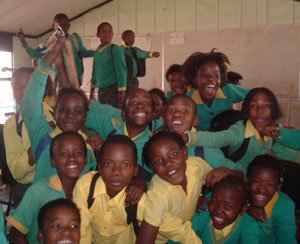First visit to Soshanguve

On the 25th, Cori made her first visit to Soshanguve, together with local resident and youth worker, Hope. After some confusion with regards time and meeting place, they visited three local schools. At all three, they met with the Life Orientation teachers to find out more about the needs in the schools. Herewith Cori's account:
Each of the schools were quite big (1000 learners) and had great resources in terms of classrooms and computers. But alongside this, the opportunity for running programs and making a difference in learners' lives was immediately obvious. Although school was finished for the day when we arrived, at each school (especially the one high school we visited) learners were hanging around the classrooms, looking ofr activities to keep them busy. Hope and I immediately got talking about the potential for a resource hub at each school, where publications could be available for learners on a whole range of topics (sex education through to leadership) as well as volunteers who could be available after school hours to advice, counsel and assist learners in the skinds of things young people are facing.
Where we initially thought to be entering a project of solely training youth workers, it seems now that our involvement in Soshanguve would also involve running some sort of project or program at the schools there. Keep watching this space for further developments!
